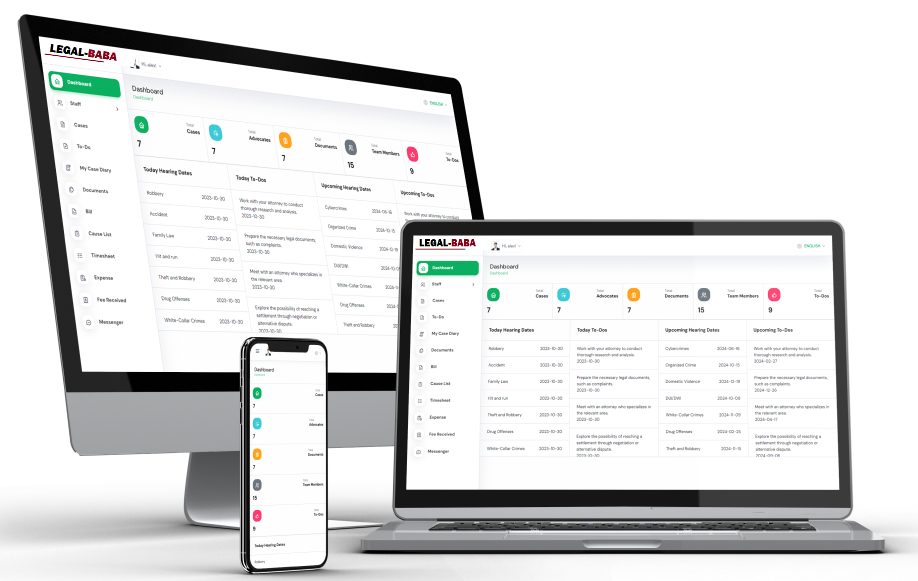Legal Practice Management Software
Legal Practice Management Software is designed to streamline the operations of law firms and legal departments. It integrates various aspects of legal practice into a unified system to improve efficiency, organization, and client service. Here’s a detailed description of the different types of legal practice management software and their core features:
Core Types of Legal Practice Management Software
- Case Management Software:
- Case Tracking: Manage all aspects of individual cases from start to finish, including case milestones, deadlines, and documents.
- Client Information: Maintain comprehensive records for each client, including contact information, case history, and communication logs.
- Task Management: Assign and track tasks associated with each case, ensuring deadlines and responsibilities are met.
- Document Management Software:
- Document Storage: Securely store case-related documents, contracts, briefs, and correspondence in a centralized repository.
- Version Control: Track changes to documents and maintain version history to ensure that the most recent and accurate documents are used.
- Document Automation: Automate the creation of standard legal documents using templates and predefined data fields.
- Time and Billing Software:
- Time Tracking: Record time spent on various tasks and cases, often with features for tracking billable hours.
- Billing and Invoicing: Generate invoices based on time entries and case details, manage billing rates, and track payments and outstanding balances.
- Expense Management: Track and manage expenses related to cases, including court fees, travel, and administrative costs.
- Client Relationship Management (CRM):
- Client Interaction Tracking: Record and manage interactions with clients, including meetings, calls, and emails.
- Lead Management: Track and manage potential clients and business development opportunities.
- Client Portal: Provide clients with access to their case information, documents, and status updates through a secure portal.
- Calendar and Scheduling:
- Appointment Scheduling: Schedule and manage appointments, court dates, and deadlines.
- Integrated Calendar: Sync with personal and team calendars to avoid conflicts and manage schedules efficiently.
- Reminders and Alerts: Set automated reminders for important dates, deadlines, and tasks.
- Legal Research Tools:
- Research Database Access: Integrate with legal research databases to access case law, statutes, regulations, and legal precedents.
- Search Functionality: Advanced search features to find relevant legal materials quickly.
- Case Law Analysis: Tools for analyzing and summarizing case law and legal research findings.
- Practice Analytics and Reporting:
- Performance Metrics: Generate reports on various aspects of practice management, including case outcomes, billable hours, and financial performance.
- Custom Reports: Create and customize reports to meet specific needs and track key performance indicators.
- Data Visualization: Use charts, graphs, and dashboards to visualize and analyze practice data.
- Compliance and Security:
- Data Encryption: Ensure that sensitive legal and client information is protected with strong encryption methods.
- Access Controls: Implement role-based access controls to restrict access to sensitive information based on user roles and permissions.
- Compliance Tracking: Monitor and manage compliance with legal regulations and industry standards.
- Client and Case Communication:
- Secure Messaging: Facilitate secure communication between clients and legal professionals.
- Document Sharing: Share case-related documents and information securely with clients and other parties.
- Case Updates: Provide clients with regular updates on the status of their cases.
- Integration with Other Systems:
- Accounting Software Integration: Sync with accounting systems for financial management and reporting.
- Email Integration: Integrate with email systems to manage correspondence and document attachments.
- Third-Party Applications: Connect with other legal tools and applications to enhance functionality and streamline workflows.
Benefits of Legal Practice Management Software
- Efficiency: Streamlines administrative tasks and case management, reducing manual effort and errors.
- Organization: Centralizes case information, documents, and communications for better organization and accessibility.
- Client Service: Enhances client interactions and satisfaction through improved communication and transparency.
- Financial Management: Improves billing accuracy, expense tracking, and financial reporting.
- Compliance: Ensures adherence to legal and regulatory requirements through secure data handling and compliance tracking.
Legal practice management software is essential for modern law firms and legal departments looking to optimize their operations, improve client service, and maintain a competitive edge.



